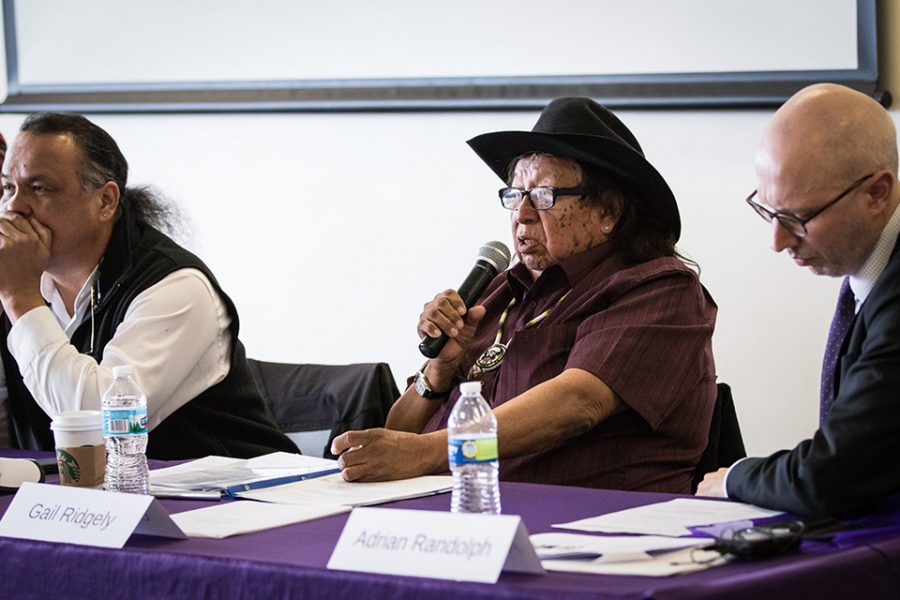Descendants of Sand Creek Massacre victims, John Evans’ relatives talk healing wounds
Keshia Johnson/The Daily Northwestern
Gail Ridgely of the Arapaho speaks at a panel discussion Tuesday about John Evans’ role in the Sand Creek Massacre in 1864. Roughly 40 people attended the event, which was hosted by One Book One Northwestern.
May 3, 2016
The Sand Creek Massacre was an atrocity, Anne Hayden said, and her great-great-grandfather John Evans was responsible.
Hayden made that statement during a panel Tuesday beside members of the Cheyenne and Arapaho communities as well as descendants of Evans. Roughly 40 people attended the event at Norris University Center, hosted by One Book One Northwestern, that focused on Evans’ role in the 1864 Sand Creek Massacre, which killed approximately 150 Cheyenne and Arapaho Native Americans.
In May 2014, an independent study committee revealed that Evans, one of Northwestern’s leading founders, was involved in the massacre.
The panelists said they have built relationships despite the troubling history. Otto Braided Hair of the Northern Cheyenne recalled his angry reaction in 1999 when Evans’ descendants requested to participate in an event commemorating the massacre.
“They’re the descendants of the perpetrator,” Otto Braided Hair said. “They don’t need no healing. They’re white. They’re the perfect race. Why should they need healing, why should they get involved, why should we let them participate?”
But that was just Otto Braided Hair’s initial reaction, he said. After discussing it with the committee planning the event, he agreed to let Evans’ descendants participate. Since then, he has grown close to Hayden and other relatives.
“Time went by, and we began to look at Evans’ descendants as humans,” Otto Braided Hair said.
Gail Ridgely of the Arapaho recalled a time when Tom Hayden — a great-great-grandson of Evans who died recently — had appeared on a panel at the University of Denver to offer recognition and apology for the acts of his ancestor. Ridgely said he was moved by the power of Tom Hayden’s actions, which went beyond a simple verbal apology.
The panel was co-sponsored by the Native American and Indigenous Student Alliance, Colloquium on Indigeneity and Native American Studies, Office of International Program Development, Medill School of Journalism, Media, Integrated Marketing Communications, Dittmar Gallery and Multicultural Student Affairs.
Medill Prof. Loren Ghiglione said the Native American Outreach and Inclusion Task Force offered recommendations in November 2014 to change how Evans is honored at NU. Ghiglione said although the University has not yet acted on them, other steps are being taken, such as hiring Native American faculty and hosting its upcoming 2nd annual dinner for Native American students in the senior class.
Although the University rejected the proposal to remove Evans’ name from campus, Ghiglione said there is still hope.
“I remain cautiously optimistic that this could change,” Ghiglione said.
Email: [email protected]
Twitter: @fathma_rahman


